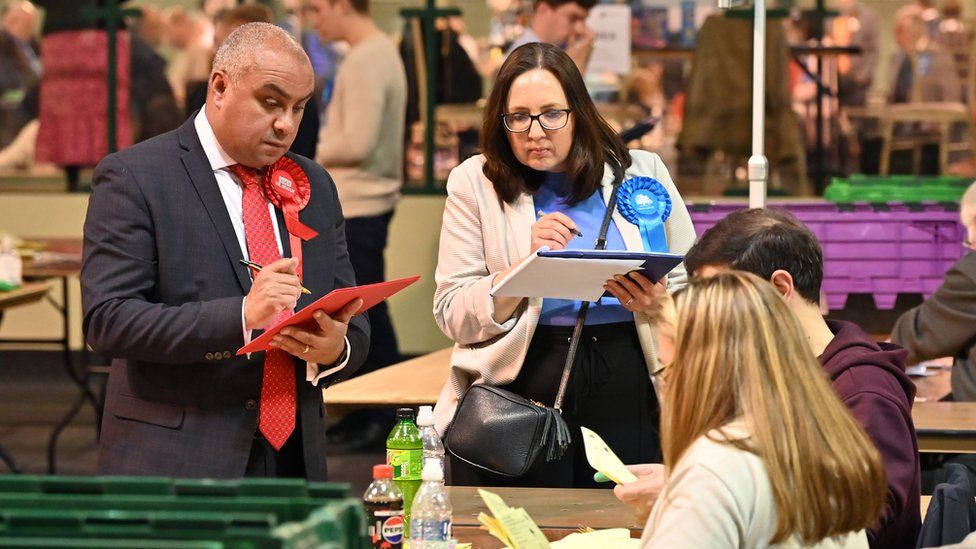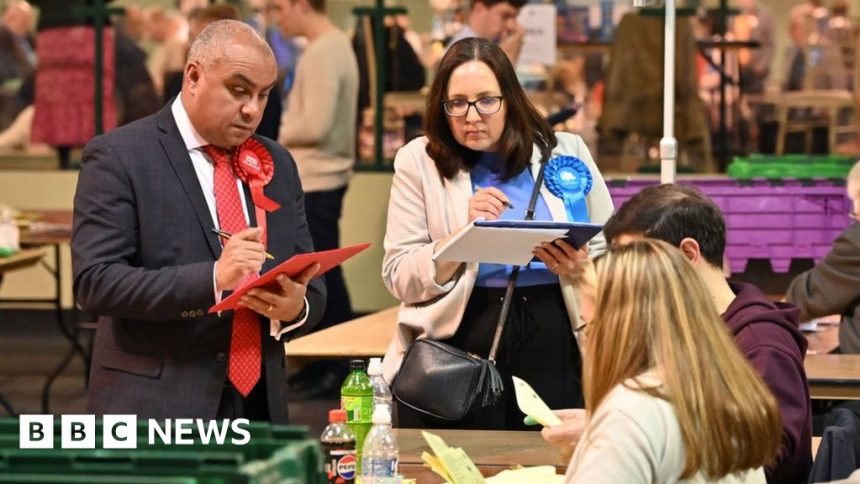Key takeaways so far from the local elections
-
Published

Millions of voters have cast their ballots in the last big test of public opinion before a general election.
The results of local, mayoral and police and crime commissioner elections in England and Wales will continue to roll in over the next 48 hours.
But here are the key takeaways so far.
Labour’s general election chances
Labour’s lead over the Tories in national opinion polls suggests Sir Keir Starmer’s party is heading for a landslide general election victory.
The result in Blackpool South is in line with national polling.
The party won a 26% swing from the Tories, the third biggest in that direction since World War Two, in what is probably the most dramatic result so far.
But Reform UK appears to have taken a big chunk of the potential Tory vote, coming a close third with 16.9% of the vote. The rebadged Brexit Party was only standing in about one-in-six of the local council contests.
Labour has so far won over 60 council seats, and gained control of Hartlepool, Thurrock, Rushmoor, and Redditch, key areas where it hopes for success later this year.
It is averaging a 5% increase in support in key wards compared to 2021, the last time most seats were contested. But its increase compared to local elections held last year is more modest.
A bad night for the Conservatives
The party has so far lost around half the seats it is defending, losing 140 seats and control of three councils, increasing internal pressure on Prime Minister Rishi Sunak.
Results so far suggest it has not made any progress in closing the gap with Labour over the last year, and indeed may have slipped back further since May last year.
But there was some respite in the Tees Valley, where incumbent Tory Ben Houchen won a third term as mayor.
The party will also be hoping for a victory in the West Midlands mayoral race to give the party something positive to talk about in the coming days.
When will the London mayor result be?
Labour’s Sadiq Khan is bidding for a third term as London mayor. But he will have to wait until late on Saturday to find out whether he has defeated his Tory opponent Susan Hall.
We are expecting results from four of the 11 regional mayor races to begin trickling in during Friday afternoon.
Gaza stance affecting Labour vote
Labour has suffered some heavy losses in wards with a large number of Muslim voters, in a sign its stance on the Israel-Gaza war is affecting its vote in those areas.
On average, the party’s vote is down 8% compared to last year in wards where more than one in ten residents identify as Muslim.
It lost control of Oldham in Greater Manchester, where two councillors quit the party over Gaza earlier this year.
National campaign coordinator Pat McFadden has acknowledged Gaza was a factor there. It will be watching to see what the impact could be in other high-Muslim seats.
By-election success for Reform UK
The party won 16.9% of the vote in Blackpool South, its best performance yet in a Westminster by-election, coming third only 117 votes behind the Tory candidate.
The share of the votes suggests that whilst around two-thirds of the Tory vote may have gone to Labour, around a third went to Reform – something that may worry Tory election strategists.
However in their previous guise as the Brexit Party, they did manage to achieve 28.9% in Peterborough in 2019.
Assessing the party’s performance in local elections is more difficult, as it is only standing just over 326 candidates in 316 wards, a very low number.
The party is yet to win a seat so far, although only three areas where it is standing – Hartlepool, Plymouth, Sunderland – have declared results.
Greens and Lib Dems eye gains
Both of these parties will be hoping to perform well in key areas, with both parties planning to run highly targeted campaigns at the general election.
The Liberal Democrats are looking to target Tory seats in southern England and will be hoping for strong results in areas like Wokingham and Elmbridge, in Surrey, and West Oxfordshire.
The party has made modest gains of 21 councillors so far, but most of their target councils are not due to declare until later on Friday.
The Greens have gained 13 seats so far, and are hoping to become the largest party in Bristol – a city containing one of its top target seats at the general election.
The party is doing well in areas with a high Muslim population – their vote is up 17.3%, while Labour’s is down 14.4% – as well in areas with a high student population.
Voter ID wrangles
Boris Johnson hit the headlines after being turned away from his local polling station after forgetting his voter ID.
The former prime minister, whose government introduced the rules, was later able to vote after returning with the right documentation.
The government also confirmed it intends to add Veteran Cards, introduced in January, to the list of acceptable ID, after some former service personnel were turned away at polling stations.
Meanwhile, Conservative MP Tom Hunt said his dyspraxia caused him to lose his passport and he had to arrange an emergency proxy vote.
Related Topics
-
-
Published5 hours ago
-
-
-
Published1 hour ago
-






